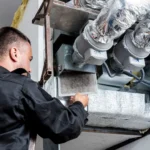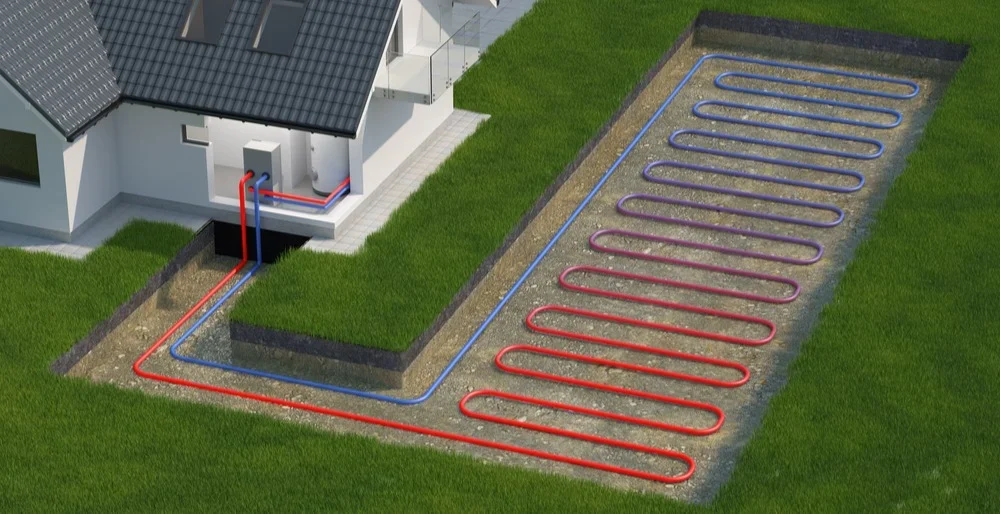

In 2022, heat pumps passed gas furnaces in sales for North America. Heat pumps are becoming increasingly popular as heating and cooling solutions for residential and commercial installations. It is vital for you, as an HVAC contractor, to have an excellent understanding of how they work and the proper methods to install them. This article will provide essential information to increase your business and profit from the electric heat pump installation boom.
A traditional furnace burns either fuel oil or gas to generate heat. An electric furnace converts electricity to heat. A heat pump functions quite differently because it doesn’t generate heat. It moves it from an outside source into a target area. Heat pumps are considerably more efficient than conventional systems. They can deliver up to four times more heat energy than the electrical energy they consume to produce it.
The types of heat pumps are differentiated by their heat source. The primary types of pumps are:
As of Jan. 2023, the Department of Energy (DOE) increased the Seasonal Energy Efficiency Ratio (SEER) required for heat pumps from 14 to 15 SEER. It also specified test procedures and new metrics to familiarize yourself with.
While air conditioners and heat pumps function similarly for cooling, you must combine air conditioners with heating systems for complete climate control. A heat pump, however, can operate in both capacities, providing heat and cooling as temperatures fluctuate.
This dual functionality makes heat pumps more efficient and cost-effective than a hybrid system. Leading heat pump suppliers sell units with SEER ratings higher than the required 15 SEER. These range from 20 to 33.1. Since higher SEER ratings come at a higher cost, you can choose the unit that best meets your customer’s requirements and budget
The cost of commercial heat pumps can vary significantly based on several factors, including the size of the system, brand, efficiency ratings, installation requirements, and additional features.
On average, commercial heat pumps can range from $5,000 to $30,000 or more. However, this price range is quite broad and can be influenced by several key factors:
One cheap alternative is ductless mini splits that cool limited zones in a home. These heat pump systems feature small units connected to a unit outside. Mini-splits mitigate the considerable heat loss that can occur from ductwork and are easier to install. Expect to charge between $1,500 and $5,000 for the units and installation.
Owners of commercial buildings and homes with extensive square footage might request a gas-fired heat pump. These units are less efficient than other types of heat pumps and have a more negative environmental impact. However, they can regulate the temperature in multiple zones and large spaces.
For all system types, from commercial units to mini-splits, Raiven’s procurement sourcing tool provides pre-negotiated discounts (up to 30%) directly from top manufacturers and distributors, stabilizing your equipment and parts costs.
You will deal with several issues when installing a heat pump. You must size it correctly, meet the electrical requirements and prepare for maintenance and troubleshooting.
Many factors go into sizing a heat pump. Your first consideration is the size of the space. The larger the area, the bigger the pump requirements. However, the same size space in different climate zones will require another size pump. One method you can use for sizing is matching the capacity of an existing air conditioner.
If no functioning air conditioner is present or the system cools insufficiently, you can use the square footage and the efficiency of an existing furnace to determine the required BTU output. The colder your climate, the more BTUs you will need. Your calculations will be similar to those an HVAC contractor performs before installing a conventional furnace. You can find a calculator and climate information here to speed up your process.
You can read the regulations for electrical systems for heat pumps in Article 440 of the National Electrical Code ( NEC). An air source heat pump requires at least 240 volts and a 30-amp circuit breaker. Larger systems may need a dedicated power supply with a circuit breaker. Depending on the size of your circuit breaker, you may be using a ten-gauge or eight-gauge wire. Since ground-sourced units don’t use fans, their electrical needs are more limited. Existing wiring with 200 amp service may be enough. Water source pumps also typically have lower electrical demand and may not require significant electrical work.
You may find that customers interested in heat pumps are also interested in electric vehicles (EVs). The extra wiring and capacity you install for an EV can provide a ready-made path to a heat pump.
Regular maintenance of heat pump systems involves cleaning and replacing worn components – preferably before a breakdown. You can handle this expeditiously with a long-term service contract attached to your warranty. You will not only ensure your customers remain satisfied and likely to recommend your work, but you will also help them avoid the cost of replacing a system.
As with any other type of system, heat pumps can develop problems. Some common causes of malfunctions are :
These problems are easily addressed and may be as simple to correct as hosing off an outdoor coil. Most of these occurrences can be prevented by regularly scheduled maintenance.
However, if your customer detects a strange odor, it could be a clue to a serious electrical issue. The smell of something burning could be coming from the wiring. A fishy scent can come from wiring or an overheated motor. Make it clear that in either case, they should call you.
Strange sounds can mean that the bearings in the motor are dirty. You will want to check them out before the motor burns out entirely.
A customer’s most significant problems will arise from an improperly chosen unit. You can prevent that issue by providing the most effective products and sizing.
Whatever direction your project takes on type of heat pump, size, brand, installation requirements, or more, Raiven can save you on all the products, equipment, and supplies. Raiven members get exclusive pricing from the biggest suppliers like Graybar, Grainger, Ferguson, Carrier, Lowe’s, and many more.
Raiven members also receive customized supply chain alerts for price and availability and access to a custom marketplace to make your purchasing easier than ever.
Raiven is here to help you win more jobs and make more profit – schedule a demo of our building materials software today.
